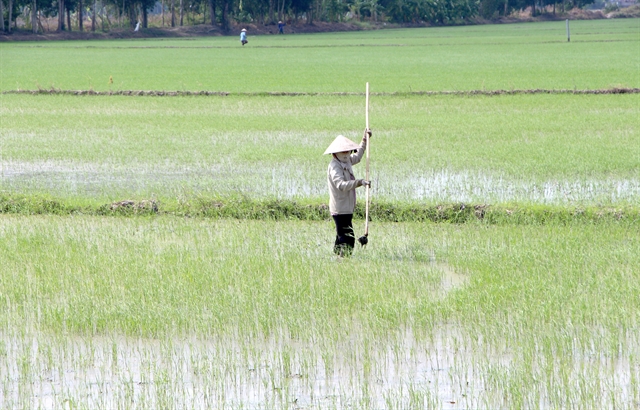 Society
Society

Local authorities in the Cửu Long (Mekong) Delta have warned farmers to stop sowing rice in many areas to avoid damage from saltwater intrusion and drought in the 2020 – 21 dry season.

|
| Farmers tend the 2020 – 21 winter – spring rice crop in the Cửu Long (Mekong) Delta province of Hậu Giang. — VNA/VNS Photo Hồng Thái |
HCM CITY — Local authorities in the Cửu Long (Mekong) Delta have warned farmers to stop sowing rice in many areas to avoid damage from saltwater intrusion and drought in the 2020 – 21 dry season.
The delta, the country’s rice granary, is expected to face severe saltwater intrusion this year, and local authorities are taking measures to mitigate its impact.
The delta has planted about 1.55 million hectares of rice in the 2020 – 21 winter – spring crop.
Following instructions from the Ministry of Agriculture and Rural Development about the winter – spring rice crop, the delta’s 12 provinces and Cần Thơ City have restructured sowing schedules and are sowing it earlier to avoid saltwater intrusion and drought at the end of the crop.
At the beginning of the 2020 – 21 winter – spring rice crop, Trà Vinh Province targeted sowing about 46,640ha between November 15 and December 30, down nearly 20,000ha compared to the winter – spring rice crops in normal years.
However, farmers have sowed nearly 50,000ha so far, and other sowing areas have been planted later than the province’s schedules and in unzoned areas.
The provincial People’s Committee has told farmers to stop sowing the 2020 – 21 winter – spring rice because the sowing schedules have ended.
Phạm Minh Truyền, director of the Trà Vinh Department of Agriculture and Rural Development, said in localities that normally face shortages of irrigation water in the dry season like districts Cầu Ngang, Duyên Hải and Châu Thành, local authorities have encouraged rice farmers to switch to growing drought-resistant crops for the winter – spring crop.
The department is monitoring the level of salinity at large saltwater prevention sluices and is storing fresh water for agricultural production and household use.
In the 2019 – 20 dry season, saltwater intrusion damaged 382ha of mùa rice, more than 23,740ha of the winter – spring rice and nearly 1,700ha of summer – autumn rice in Trà Vinh, causing a total loss of VNĐ919 billion (US$40 million), according to the department.
The delta’s local authorities have warned farmers not to grow the late winter – spring rice in saltwater-affected areas to avoid shortages of irrigation water at the end of the crop and switch to drought-resistant crops.
In Sóc Trăng Province, localities have warned farmers not to grow the late winter – spring rice as saltwater intrusion could cause heavy damage as it did in the 2019 – 20 dry season, when it damaged more than 4,000ha of rice in coastal districts, according to the provincial Department of Agriculture and Rural Development.
Đào Đắc Hùng, chairman of the Mỹ Xuyên District People’s Committee in Sóc Trăng, said the district has 8,000ha of the early winter – spring rice which are blooming or ready for harvest.
The price of rice is high this year, so farmers in the district want to grow the late winter – spring rice, he said.
The district has told farmers not to grow the late winter – spring rice and switch to other crops like watermelon and gourds and avoid damage from saltwater intrusion and drought, he said.
Saltwater intrusion is expected in Sóc Trăng this month, according to the province’s Irrigation Sub-department.
Phạm Tấn Đạo, head of the sub-department, said irrigation canals in rice fields now have plenty of water, but water resources can only serve the early winter – spring rice crop.
If farmers grow late winter – spring rice, especially in coastal areas, the irrigation canals will not be able to supply sufficient irrigation water as the 2020 – 21 dry season is expected to be severe, he said. — VNS




